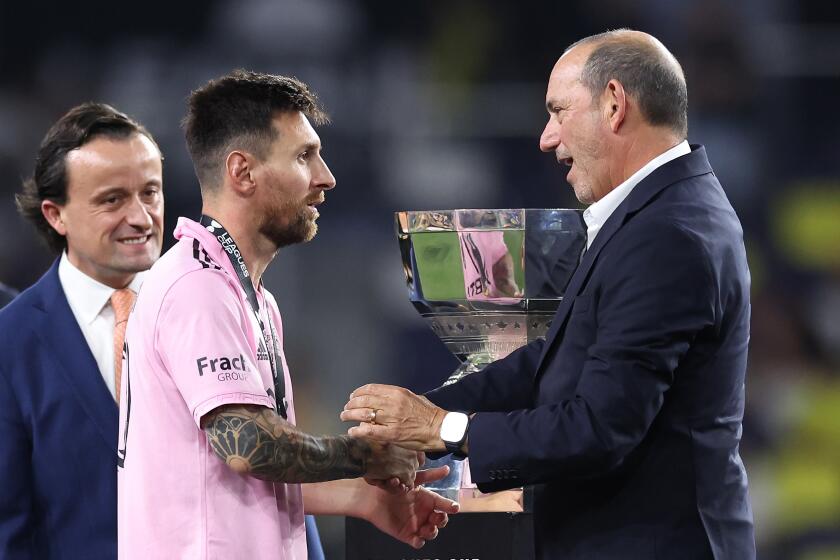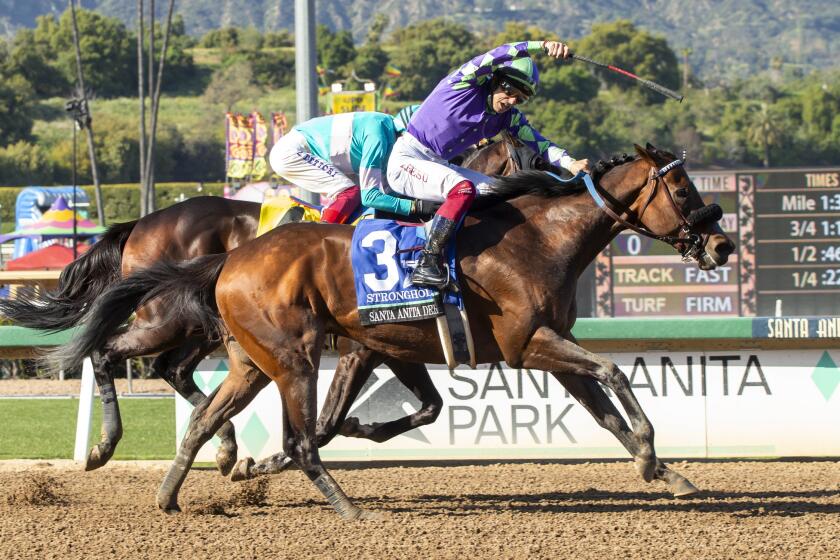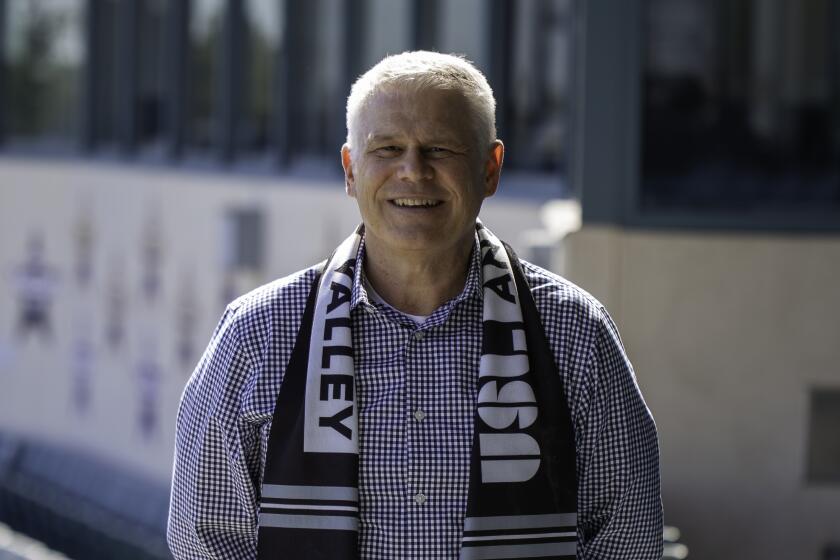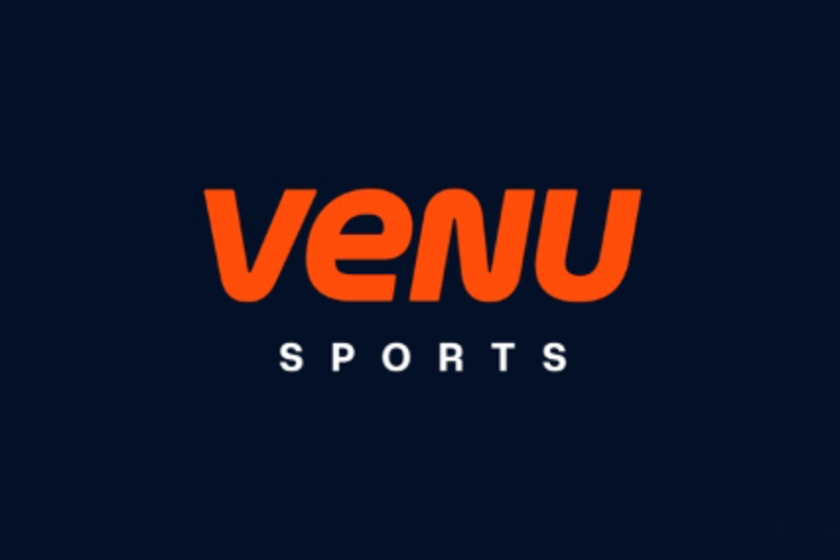NFL Is Hoping to Score With DNA ‘ID Tags’
The NFL’s hopes of auctioning memorabilia from Sunday’s Super Bowl game rest on the technological capabilities of a small Orange County company that uses synthetic DNA “ID tags” to mark league products, including the footballs to be used in the game.
The work of Collectors Universe Inc. is part of a trend that has seen a number of companies use synthetic DNA to guard against fake movie props, Sydney Olympics products and other collectibles in a field rife with fraud.
On Friday, the Santa Ana company’s Professional Sports Authenticator division branded 120 footballs with invisible ink infused with a chemically created DNA strand. The NFL may sell some of the footballs online, an arena that magnifies the shaky problems of the collectibles market.
Showing off the technique in pregame hoopla, Professional Sports executives using special pens marked 25 of the balls in public--just after a ceremony dedicating the coins to be tossed to start the game.
Although easy to dismiss as a sideshow, the DNA photo opportunity underlines how seriously professional sports take the problem of fake memorabilia.
The vast number of phony and doctored items in the collectibles industry also has opened opportunities for Professional Sports and Collectors Universe, which started in 1986 by grading rare coins for quality. It now provides authentication, grading and auction services for a wide range of collectibles, including currency, trading cards, autographs, stamps and recordings.
Professional Sports, which got its start grading baseball trading cards, has been using invisible ink with DNA for the last two years to mark items ranging from signed Jerry Lee Lewis photos to Mark McGwire’s 70th home-run ball, which sold for $3 million two years ago. It used the ink on last year’s Super Bowl footballs too. Other companies have applied similar ink to guard Sydney Olympics merchandise and movie studio props.
“We were very aware [of] what [Professional Sports] was doing,” said Seth Rabinowitz, the NFL’s director of business development. “They have a great brand, and buyers know it and put a lot of weight in it.”
The chance of randomly duplicating the code in a DNA strand, the company said, is one in 33 trillion--the kind of odds that the NFL hopes will inject confidence in memorabilia fans.
Confidence about the authenticity of items has become especially crucial online, where the NFL launched partnerships with EBay and Yahoo last fall, because it’s so tough to verify the authenticity of items without a third-party expert to vouch for them.
“A huge merchandising scandal would ruin things just as the leagues are starting to establish really important relationships with these Internet companies,” said Los Angeles sports marketing consultant David M. Carter.
And without confident buying, Collectors Universe itself would find it hard to reach a major goal: continuing to expand the burgeoning memorabilia market beyond hard-core collectors.
Last year, said David G. Hall, the company’s chairman, $400 million to $500 million in autographs from sports stars, celebrities and historical figures were sold, “from Leonardo da Vinci to Leonardo DiCaprio.”
But after a major investigation, the FBI reported in April that up to 90% of all sports autographs are fake, along with the authenticity letters accompanying them. The news hurt Collectors Universe’s stock price, even though no one in the company was tarnished by the FBI report.
Flanked in his office by a real Einstein letter and a fake Lou Gehrig autograph with a phony authenticity letter from “J. DiMaggio Co.,” Hall said worries about fraud will help the company by creating more demand for its multitiered authentication services.
The company’s experts authenticate old autographs, trading cards, coins and stamps, and its witnesses watch as new autographs are signed or game balls used. The main stamp of authenticity is provided by visible, tamper-resistant labels or holograms that assign each item a serial number.
The DNA-laced invisible ink applied to balls, bats and other memorabilia provides another security level because it glows under certain laser frequencies known to the company. And though no one has yet asked for the service and few are ever expected to, a lab could match the hidden DNA against the company’s secret DNA strand as a final test.
Potential buyers can use the serial numbers on items to call up online descriptions and pictures of the real articles on Internet sites.
At the Super Bowl, the company has been authenticating autographs signed by players in a tent beside Raymond James Stadium in Tampa, Fla. “It was a zoo,” Hall said, with hundreds of fans jamming the tent for hours.
Collectors Universe was paid for that work as part of “a big package deal with the NFL,” he said. He didn’t disclose details.
Rabinowitz said most of the league’s proceeds from the EBay auction program are given to charity. Players involved in crucial plays in the game will be allowed to keep the balls they use. The rest of the 120 balls authenticated by Professional Sports will be given to charities or auctioned on EBay, he said.
With so many collectibles trading over cable TV, the Internet and storefronts, over-saturation is a threat, and like athletes who go hot and cold, so can the collectibles market when fads and interest wanes--or the economy sours.
The leagues and their licensees got a harsh lesson in a related area when fashion shifted away from sports apparel in the mid-1990s and retailers cut shelf space for such products. And the price of sports cards, particularly those from recent decades, has dropped recently, decreasing demand for Collectors Universe ratings “a little bit,” Hall said.
Moreover, recent investor disenchantment with Internet companies has helped push the company’s shares down from $10 in February to the $2 range in recent months. The stock closed at $1.91 on Friday, up 6 cents a share, on Nasdaq.
About 45% of Collectors Universe’s business comes from conducting auctions, catalog sales and direct sales. The rest is from grading and authenticating services. It earned $1.5 million on $42.4 million in sales for its last fiscal year ended June 30.
Hall, 53, got his start by trading coins 37 years ago. “I used to hang out at coin shops in downtown Santa Ana with grizzled old men who would cheat their mother out of a nickel,” he said.
Now, aided by $24 million from a November 1999 initial public offering, he has assembled 270 employees, including prominent names in the auction and verification business.
They are “all graduates of the collectible school of hard knocks,” Hall said.
“Now we’re in the process of consolidating the major collectibles markets,” he said. “We’ve grown very rapidly, and we see that growth continuing as we add more experts and more No. 1 positions to our family.”
(BEGIN TEXT OF INFOBOX / INFOGRAPHIC)
Fingerprinting Collectibles
A Santa Ana sports collectibles authentication company applied an identification tag to 120 Super Bown footballs. How it works:
1. Apply invisible DNA-laced mark to football. There is a 1-in-33-trillion chance of randomly replicating synthetic DNA.
2. DNA tag sparkles under infrared laser.
Source: Dave Gioia, Collectors Universe Inc.
Graphics reporting by BRADY MacDONALD / Los Angeles Times
More to Read
Get our high school sports newsletter
Prep Rally is devoted to the SoCal high school sports experience, bringing you scores, stories and a behind-the-scenes look at what makes prep sports so popular.
You may occasionally receive promotional content from the Los Angeles Times.







